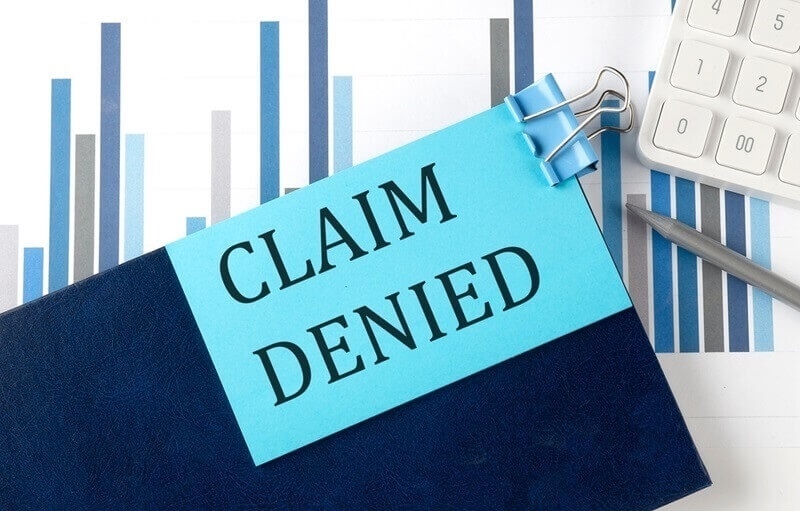
Pursuing an insurance claim must be a walk in the park and not a chore. Yet in the United States of America, far too many insureds are threatened with perpetual possibilities of insurance claim denial. Auto insurance, health, life, and homeowners coverage—whatever you may hold, it works to your favor to know the causes of insurance claim denial so that you are not denied and go through it as smoothly as possible. Let’s explore common denial reasons auto insurance U.S., health insurance pre-existing condition denials, life insurance non-disclosure claim denials, and more.
In this guide, we’ll unpack the common reasons U.S. insurance claims are denied and provide actionable strategies to avoid denials and secure rightful settlements—right from the notice to the final check.

One of the most common insurance claim denial reasons is insufficient documentation. Insurance companies require detailed evidence to validate your claim—missing receipts, photos, or incomplete claim forms can all lead to rejection.
How to avoid it:
Accuracy in paperwork is everything when you are dealing with homeowners' claim reasons for denial or auto insurance.
Every policy provides definite time limits for reporting accidents. Delay in submission within the stipulated time is one of the top reasons for denials, especially for motor vehicle insurance claims in America.
How to avoid it:
Too many people believe they're covered only to discover the actual event is excluded from the policy. Flood damage, for example, does not fall under standard homeowner insurance unless included specifically. This results in extreme homeownership claim denials for cause, more particularly, natural disasters
How to prevent it:
Be prepared rather than caught off guard when disaster strikes by knowing your coverage limits.
It is one of the most common reasons through which insurance claims denials occur in the U.S. health industry. Even though most pre-existing condition denials are actually forbidden under the Affordable Care Act (ACA), short-term or non-ACA-compliant plans can still deny the claims.
It is one of the most common health insurance pre-existing condition denials.
How to avoid it:
When in doubt, request written clarification before purchasing a plan.
Life insurance claims are mostly denied because of non-disclosure, when the policyholder withholds or misrepresents health issues, habits, or lifestyle activities. This results in rejections at underwriting or after death.
How to avoid it:
Honesty during application is required since policyholders have the right to have their insurance policy canceled retroactively due to misrepresentation.
Another top cause of insurance claim rejection is that the policy was not in force or had lapsed at the time of loss. This is for all types of insurance—health to auto and homeowners' insurance.
How to avoid it:
A dormant policy makes an otherwise valid claim a roadblock.
In auto insurance, disputes of fault most typically lead to claim denial. Insurers can say you were at fault, or you don't know whose fault the other driver was—one of the leading auto insurance U.S. denial grounds.
How to avoid it:
Being detailed and timely can be the difference in your auto insurance claim.
The insurer can reject the claim if it believes the policyholder did not take measures to prevent additional damage after something happened. For example, in a homeowner's claim, not tarring an unchecked leak in your roof can void your claim.
How to avoid it:
Damage control not only saves your property but also the validity of your claim.
Some claims are rejected on suspicion of fraud, especially when the facts seem contradictory. Even genuine claimants are rejected when they unknowingly raise red flags. This is a more likely insurance claim denial reason in high-pay-out policies such as life or homeowners insurance.
How to avoid it:
If uncertain, retain the services of a lawyer or public adjuster to represent you.
Poor maintenance reasons are commonly attributed by homeowners to denial. Insurers expect the homeowner to take care of the home. The claim may be denied for water damage when pipes were damaged by bursting because the homeowner didn't maintain his pipes properly.
How to prevent it:
Prevention is better than cure-it's often required.
Denial can be intimidating, but it doesn't have to be a roadblock. Here's what to do when a claim is denied in the U.S.:
Make a Request for Written Explanation: Insurers are legally obligated to provide a denial letter with the explanation.
Check Your Policy: Verify the denial against your policy language.
Gather Evidence: You will need documentation, photos, expert testimony, and records.
Appeal the Decision: Most companies use the formal process of appeal.
Seek Professionals: You may consider the services of an attorney or public adjuster for large or complex claims.
Complaint: Unfair conduct can be complained about to your state Department of Insurance.
Note, appeals tend to work out well when grounded in good documentation and legal argument.
Avoiding insurance claim denial reasons begins before even having the claim. Here are some bonus tips to reduce your risk:
Keep things in order: Maintain a digital and hard copy folder for each policy.
Know your rights: Familiarize yourself with state laws and consumer protection.
Communicate clearly: Miscommunications with agents or adjusters can lead to denials.
Contact your insurer: Life changes such as a move, job change, or new diagnosis can impact your coverage.
Some precautions can cut months of worry and financial stress.
Insurance denials occur in the United States more than most people think. Health insurance pre-existing condition denials, life insurance non-disclosure claim denials, or homeowners claim denial reasons all occur. Understanding your policy, keeping good records, and being timely are required. Understanding what to do in case of denial in America and how to avoid it makes you prepared for the shift from bewilderment to trust, from notice filing to the receipt of the compensation you are owed. Denial ought not to deter you—know, beware, and always battle for your rights as a policyholder.
This content was created by AI